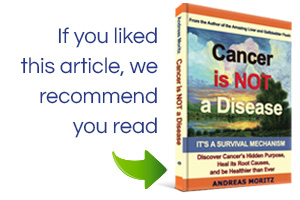By Andreas Moritz
According to the laws of quantum physics, in any scientific experiment the observer (a researcher) influences and alters the object of observation on a very fundamental level (observer-observed relationship). This fundamental principle of physics applies to you just as much. After all, your body is composed of molecules that are made of atoms; these atoms are composed of subatomic particles, which in turn, are made of energy and information. There is actually not even a trace of matter in what we consider physical creation. Although something may appear to be as solid and concrete as a rock, there is nothing solid about it; only your sensory perception makes it appear so.
Your thoughts also are merely forms of energy and information that influence other forms of energy and information, including the cells of your body. For example, if you are sad about something that happened to you, your body posture changes and your eyes lose their luster. Eye cells, like all other cells in the body, respond to your thoughts as a soldier follows the orders of his superior.
Therefore, if you believe strongly enough that you have cancer or if you are afraid of it, you face a significant risk of manifesting it in your body.
The placebo effect can work both ways. The belief that you have a deadly disease can be just as powerful as the belief that a certain medical drug can heal you. In an instant, the energy of your thoughts and beliefs delivers the information they contain to every cell in your body. The energy and information that make up the atoms, molecules, genes, cells, organs and systems in your body have no agenda of their own. They are certainly not malicious. All they do is follow orders. You manifest both what you like and what you do not like. In other words, you are what you believe. Furthermore, what you believe is determined by the way you see or perceive things. Clearly, your interpretation of cancer as a disease will likely turn it into a disease for you. Otherwise, cancer would just be a survival mechanism or a signal for you to take care of those aspects of your life that you have neglected thus far.
If you believe that cancer is a disease, you are more likely to be inclined to fight against it, physically, emotionally, and spiritually. If you are strong-willed and the weapons you are using are powerful, you may be able to subdue this ‘enemy’ of yours, at least for a while. In such a case, you will be proud of having ‘beaten’ the cancer and, perhaps, you will praise the doctors or the medical treatment you endured for having saved your life. If you are weak and you use these same weapons in an attempt to destroy the cancer, you are likely going to succumb to what you would consider a malicious enemy. The doctor will express with regret that your body did not sufficiently ‘respond’ to the treatment (the weapons), claiming that he tried everything and that nothing more could be done. He will neglect to inform you that the weapons he has put into your body can be deadly.
Chemotherapy is so poisonous that leaking a few drops of the drug onto your hand can severely burn it. If drops fall on a concrete floor, they can burn holes into it. Spilling any chemotherapeutic drug in the hospital or anywhere en route is classified as a major biohazard and it requires specialists with space-suits to dispose of it.
Just imagine the holes chemotherapy creates inside your blood vessels, lymphatic ducts, and organ tissues when you undergo infusion after infusion! I have looked at the irises of patients (using iridology) who have gone through chemotherapy, and I saw the considerable erosion and damage of tissues throughout the body. Yes, this drug destroys cancer cells, but along with them, many of your healthy cells, too. Your entire body becomes inflamed. For this reason, your hair falls out when you undergo chemotherapy or radiation, and you cannot digest food anymore. Many patients develop anorexia – the loss of appetite or desire to eat. But this is not the only risk you can expect from modern cancer therapies. “Chemotherapy and radiation can increase the risk of developing a second cancer by up to 100 times,” according to Dr. Samuel S. Epstein ~ Congressional Record, Sept. 9, 1987.
Given the extreme suffering cancer patients are being subjected to by undergoing cancer treatments, people like Jackie Onassis were fortunate to have died quickly, although unnecessarily. Tim O’Shea wrote in To The Cancer Patient: “…Chemo drugs are some of the most toxic substances ever designed to go into a human body, their effects are very serious, and are often the direct cause of death. Like the case of Jackie Onassis, who underwent chemo for one of the rare diseases in which it generally has some beneficial results: non-Hodgkins lymphoma. She went into the hospital on Friday and was dead by Tuesday.”
I have personally seen cancer patients who successfully and naturally reversed their cancers but were then talked into taking a round of chemotherapy just to be sure to “get it all”. They all died within a day or two of the first treatment.
The methods of modern medicine don’t fight disease, they fight the body. Disease is the body’s way of healing itself, and modern treatment is a sure way to impair or even destroy this ability.
——————————
This is an excerpt from my book CANCER IS NOT A DISEASE! – IT’S A SURVIVAL MECHANISM
——————————
You may share or republish this article provided you clearly mention the name of Andreas Moritz and paste a hyper link back to the web page





